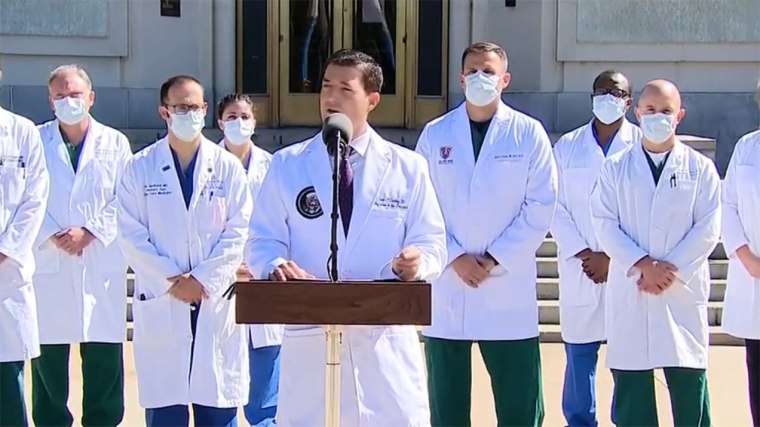When a sitting American president is hospitalized with a potentially deadly virus, and much of his team also tests positive, it is unquestionably a national crisis. And in the midst of a genuine national crisis, citizens need to be able to turn to the authorities for accurate and reliable information that people can trust.
But in the case of Donald Trump's coronavirus infection, that's obviously not what's happening.
What the nation instead confronts is a series of cascading failures: Trump's failure to take the pandemic seriously led to a failure to prevent the president from being infected, which led to a White House operation that failed to tell the public the truth.
After Trump disclosed his positive test early Friday morning, it seemed inexplicable that there was no press briefing with physicians. A day later, there was a press briefing, which proved to be vastly worse than nothing: when Dr. Sean Conley, the White House physician since 2018, wasn't just being evasive, he was also offering a series of assertions that he later retracted.
When the osteopathic doctor wrapped up his unfortunate and unhelpful presentation, White House Chief of Staff Mark Meadows offered a wildly different assessment on the president's condition, only to see Meadows change direction once more soon after.
Offered a chance to put things right on Sunday, Team Trump made the mess messier. The Washington Post reported overnight that the White House "continued to provide limited and contradictory information" about the president's health.
At a news conference earlier Sunday, Trump's medical team tried to clear up the muddled picture it had created the previous day when White House doctor Sean Conley falsely suggested that Trump had not been given supplemental oxygen. But Conley continued to avoid directly answering specific questions about Trump's health Sunday, even as he revealed that the president had been given dexamethasone, a steroid that is typically reserved for severely ill coronavirus patients needing oxygen. Conley openly admitted to withholding truthful information about Trump's plummeting blood-oxygen levels Friday, indicating he did so to put a positive spin on the president's improving condition.
The physician specifically told reporters, "I was trying to reflect the upbeat attitude that the team, the president, that his course of illness, has had. I didn't want to give any information that might steer the course of illness in another direction. And in doing so, you know, it came off that we were trying to hide something, which wasn't necessarily true."
First, the word "necessarily" seemed to be doing quite a bit of work in that sentence. And second, the idea that the truth might "steer the course of illness in another direction" is every bit as bizarre as it seemed.
In a separate report, senior White House officials -- people one might expect to have accurate information about the president's condition during a national crisis -- conceded that they didn't have confidence in what they were hearing from their own colleagues.
"I can tell you what I am hearing, but I honestly have no idea if it's right," said one senior administration official close to the president. "A lot of people aren't even telling other people in the building the truth."
In this case, "the building" refers to the White House. In other words, we've arrived at a dysfunctional dynamic in which White House aides don't trust other White House aides because everyone is lying to everyone.
Open a Crisis Management 101 textbook and the lessons are clear: be transparent, honest, and accurate with information. Make sure everyone is on the same page. Tell people what you know, acknowledge what you don't know, and resist the urge to play games with details or expectations.
It now appears Team Trump opened the textbook and decided the smart move would be to do the opposite of the proscribed lessons.
To be sure, the Republican and his operation was already widely recognized for its staggering dishonesty. To know anything about the incumbent president is to know that he lies, at times uncontrollably, about matters large and small.
But instead of closing their credibility gap, Trump and his team made it worse.
